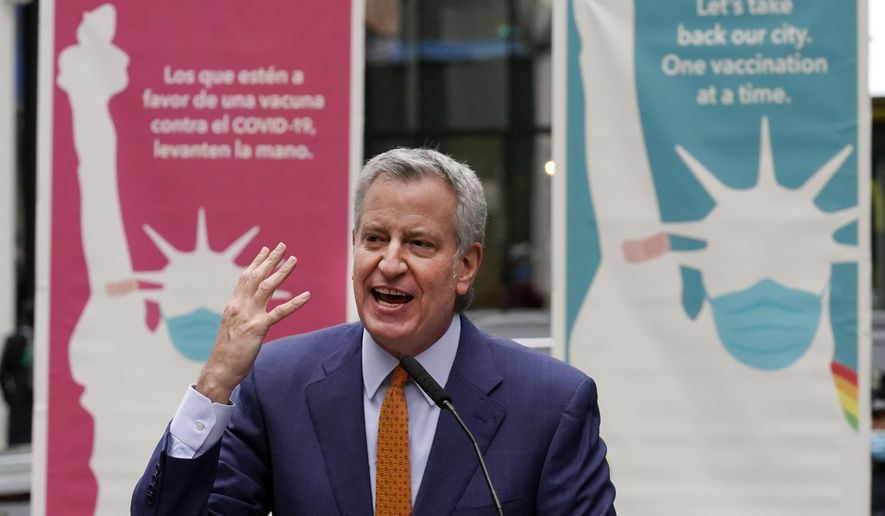New York City this week became the first U.S. city to open government-approved injection sites for people to use heroin and other narcotics under medical supervision.
Mayor Bill de Blasio and the city’s health department announced Tuesday the opening of the drug use sites, describing them as an “extension of existing harm reduction services” that will share locations with previously established syringe service providers, with hopes of preventing drug overdoses.
“After exhaustive study, we know the right path forward to protect the most vulnerable people in our city. And we will not hesitate to take it,” the mayor said. “Overdose prevention centers are a safe and effective way to address the opioid crisis.”
New York’s embrace of supervised injection sites comes on the heels of a recent Centers for Disease Control and Prevention estimate that more than 100,000 people in the U.S. died from drug overdoses in the 12-month period ending in April — a new record.
Provisional data shows 596 people died from drug overdoses in New York City in the first quarter of 2021, between January and March — the most overdose deaths in a single quarter since reporting started in 2000, according to Mr. de Blasio’s office. The rate of overdose deaths climbed to 30.5 per 100,000 New York City residents in 2020 from 21.9 in 2019.
The New York City health department reported that 2,062 residents died of overdoses last year, the most since reporting began in 2000.
Supervised injection sites have been suggested by some health and government officials for years in New York and other U.S. cities but have been derailed by political opposition and legal hurdles.
In Philadelphia, Safehouse, an organization that offers overdose prevention services, was set to open a supervised injection site last year. However, the plan became tangled in the legal system and an appeals court ruled earlier this year that it is a crime to open a property for the purpose of using drugs.
Attorneys for the organization filed a petition with the Supreme Court in August, asking the justices if offering medically supervised consumption services to prevent opioid overdoses is considered a crime. The Supreme Court in October declined to take up the group’s case.
Rhode Island in July became the first state to authorize supervised injection sites. The state law also establishes a two-year pilot program aimed at preventing drug overdoses by setting up safe injection sites or “harm reduction centers,” The Providence Journal reported. San Francisco is working to open injection sites while Denver has attempted to in the past.
“These sites could reduce some immediate deaths as supervised injection would include ready access to naloxone, and they can assist more persons to more quickly get engaged in treatment and recovery support services,” said William Stauffer, executive director of PA Recovery Organizations Alliance. “We have a severe and worsening addiction epidemic, made worse by the pandemic and related social and economic upheaval. We should implement these sites where they make sense to implement.”
San Francisco could open its first supervised injection site as soon as spring of next year in the Tenderloin District, KTVU Fox 2 reported, citing Mayor London Breed’s office.
Conversely, other communities in the Seattle area and elsewhere have talked about banning these sites or outlawed them. Federal law also prohibits operating a place for illegal drug use.
Those who oppose the sites have said the facilities are not effective at reducing overdose deaths and lead to increases in crime and litter.
“Safe injection sites have not delivered on their promises and have caused a significant increase in trash, crime, and disorder. Public health experts have built safe injection facilities with little public input, creating problems for long-time residents,” said Christopher Rufo, a former visiting fellow for domestic policy studies at The Heritage Foundation, in an op-ed last year, referring to Canadian communities that have set up injection sites.
An estimated 100,306 people died of drug overdoses in the U.S. over a yearlong period ending in April, an increase of 28.5% from the 78,056 deaths reported during the same period the year prior, the CDC reported Nov. 17, citing provisional data. The health agency said overdose deaths from synthetic opioids (mostly fentanyl), psychostimulants such as methamphetamine, cocaine and semisynthetic opioids such as prescription pain medication increased.
New York City officials said supervised injection sites in Europe have proven to be safe places where people who use drugs can get medical care and connect with treatment and social services and have helped prevent overdose deaths.
The facilities have also been found to reduce HIV infections and ambulance calls for overdoses, according to some studies.
“The bulk of the evidence suggests that overdose prevention centers have shown promise in reducing harms and social costs associated with injection drug use, including reversing overdoses and linking people to medical care for addiction,” said Dr. Nora Volkow, director of the National Institute on Drug Abuse. “In addition, the research does not suggest that overdose prevention centers are associated with any significant direct risks, like increased crime or drug use in surrounding communities. However, far more research is needed to inform the feasibility and effectiveness of overdose prevention centers.”
A health department impact study found that establishing four supervised injection sites in New York City neighborhoods most affected by fatal drug overdose could save up to 130 lives each year and $7 million in yearly health care costs.
The sites will be in communities based on health needs, and city agencies will run joint operations focused on handling street conditions throughout the city, NYC officials said.
— This article is based in part on wire service reports.
• Shen Wu Tan can be reached at stan@washingtontimes.com.




Please read our comment policy before commenting.